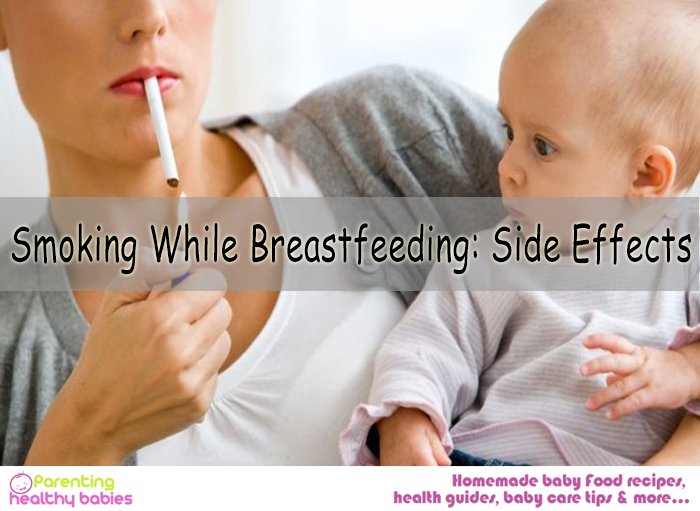Breastfeeding provides your baby nutrition and immunity to fight illness and infections that she can contract from the outside environment. Additionally, breastfeeding is a way you can bond with your little one. Like pregnant women are forced to quit smoking, it is important to ensure that breastfeeding women also stop smoking.
Breastfeeding mothers should be aware that smoking can pose serious threats to your growing baby. Hence, it is important to know the side effects caused when breastfeeding mothers resort to smoking.
Read More: 15 Things You Shouldn’t Do During Pregnancy
Should a breastfeeding mother smoke?
The first question that should arise to every mother post-delivery is if she should continue to smoke. A mom who plans to breastfeed her baby for a longer time should simple give up the idea of smoking. The more you smoke, the greater are the health risks for your baby. If you cannot quit smoking, it is better to stop breastfeeding and shift your baby to formula feed. Breastfeeding and smoking cannot go hand in hand.
Does Nicotine Content in cigarette smoke transfer to breast milk?
Yes, the active drug in cigarette smoke is nicotine and it gets transferred from a mother to her baby through breast milk. The relationship is directly proportional. The more the mother smokes, the more nicotine is passed to the baby via breast milk. When nicotine is consumed by the baby through the mother, it reaches the blood stream and causes the release of adrenaline or epinephrine by the adrenal glands. The increase in epinephrine can cause the following reactions in your baby
- Increase in heart rate
- It Increase in blood pressure
- Increase in breathing rate and respiratory disorders
Nicotine also triggers the release of dopamine, which is a neurotransmitter. Excess exposure to nicotine of cigarette smoke can modify brain cycles and cause physiological changes in both the mother and infant.
Effects of Smoking on Babies
- Babies exposed to smoke are at a higher risk of developing pneumonia, bronchitis, eye irritation, sinus infections, and asthma.
- Babies whose mother smokes frequently experience more colic and other digestive disorders. The nicotine content in active smoke gets transferred through breast milk and upsets the baby stomach. The passive smoke acts as an irritant for your baby’s respiratory system.
- Smoking by breastfeeding moms cause symptoms such as diarrhoea, vomiting, nausea, and abdominal cramps in babies.
- Babies born to smoking mothers are at a greater risk of dying from Sudden Infant Death Syndrome.
- Babies exposed to cigarette smoke due to mother have decreased blood levels of HDL, which is a good cholesterol and helps protect the baby against coronary heart diseases.
How does Smoking affect Breastfeeding?
If new mothers plan to breastfeed, then smoking is strictly a no. Smoking has the following impacts on breastfeeding
- Early weaning. Women who smoke continuously tend to wean off their babies from breastfeeding earlier than usual.
- Smoking reduces milk production.
- Smoking interferes with the milk let down process.
- The hormone “prolactin” is essential for milk production. Mothers who smoke have lower levels of prolactin. Hence the milk synthesis slows down.
Read More: Fetal Alcohol Syndrome: Symptom, Cause, Risk, Prevention
How to minimize the risk of smoking to your baby?
- The ideal situation is to completely quit smoking if you are breastfeeding your baby.
- Cut down gradually. The lesser you smoke, the minimal the chances of risk to your little one.
- Do not smoke during or immediately before breastfeeding. This inhibits let-down and is dangerous for your baby.
- If you wish to smoke, do it immediately after breastfeeding so that the nicotine levels in breast milk reduces within 3 to 4 hours and is safe when you breastfeed your baby next.
- If you are smoking, ensure that you do not do it the same room with your baby inside. Also avoid second or passive smoking as it can cause irritation to your baby’s respiratory system.
It is best not to smoke while breastfeeding your baby. However, if you still wish to smoke, it’s advised that you contact your health practioner to know the allowed and safe limit of cigarette smoke to your little one. Smoking is a stress-busting mechanism for many mothers. However, alternative relaxation techniques will help you distract your concentration towards smoking.
For those who are desperately trying to quit can join rehabilitation programs that counsel new mothers and provide alternative methods to help quit smoking. There is no need to stop breastfeeding completely. Finding alternative ways to reduce smoking is more ideal. After all your little one is more precious to you than a nagging lifestyle habit. It is always better to be safe than sorry.
References
https://www.ncbi.nlm.nih.gov/pmc/articles/PMC2277470/
https://www.laleche.org.uk/smoking-breastfeeding/













